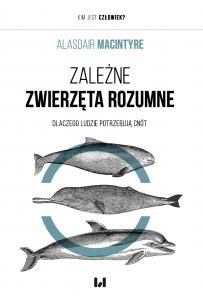-
2382
-
1653
-
1435
-
1248
-
1101
Zależne Zwierzęta Rozumne. Dlaczego ludzie potrzebują cnót

Alasdair MacIntyre sprzeciwia się stanowiskom akcentującym istnienie radykalnej, jakościowej różnicy między kondycją zwierzęcą i ludzką. Zwraca uwagę na różne formy wspólnotowego życia, które odgrywają istotną rolę w wielogłosie współczesnych dyskusji w dziedzinie filozofii moralności, a także w kształtowaniu i utrzymywaniu naszych zdolności do prowadzenia dobrego życia.
Alasdair MacIntyre (ur. 1929). Filozof, etyk i historyk idei, jeden z ważniejszych współczesnych filozofów moralności. Ukończył studia na uniwersytetach w Londynie, Oksfordzie i Manchesterze. Twórca jednej z odmian komunitaryzmu. Autor m.in.: Marxism: An Interpretation (1953), A Short History of Ethics (1966), After Virtue (1981), Whose Justice? Which Rationality? (1988), Three Rival Versions of Moral Enquiry (1990), Edith Stein: The Origin and Development of Her Thought (2005).
Arystoteles, Etyka nikomachejska, tłum. Daniela Gromska, Warszawa 1982.
Arystoteles, Metafizyka, [w:] idem, Dzieła wszystkie, t. II, Warszawa 2003.
Arystoteles, Zoologia. Historia animalium, tłum. Paweł Siwek, Warszawa 1982.
Arnhart Larry, Darwinian Natural Right: The Biological Ethics of Human Nature, New York 1998.
Asch Solomon E., Forming Impressions of Personality, „The Journal of Abnormal and Social Psychology” 1946, 41 (3), s. 258–290.
Barad Judith A., Aquinas on the Nature and Treatment of Animals, San Francisco 1995.
Becker Lawrence C., Reciprocity, London 1986.
Bel’kovich V. M. i in., Herd Structure, Hunting, and Play Bottlenose Dolphins in the Black Sea, [w:] Dolphin Societies: Discoveries and Puzzles, red. Karen Pryor, Kenneth S. Norris, Berkeley–Los Angeles 1991, s. 17–77.
Bennett Jonathan, Rationality, London 1964.
Cohn Bernard S., Colonialism and Its Forms of Knowledge: The British in India, Princeton 1996.
Davidson Donald, Expressing Evaluations, Manhattan 1982.
Davidson Donald, Thought and Talk, [w:] idem, Truth and Interpretation, Oxford 1984, s. 155–170.
Dewey John, Experience and Nature, La Salle 1925.
Dion Karen, Berscheid Ellen, Walster Elaine, What is Beautiful is Good, „Journal of Personality and Social Psychology” 1972, 24, s. 285–290.
Dolphin Societies: Discoveries and Puzzles, red. Karen Pryor, Kenneth S. Norris, Berkeley–Los Angeles 1991.
Dunbar Robin, The Ghost in the Machine, [w:] idem, Grooming, Gossip, and the Evolution of Language, Massachusetts 1996, s. 80–105.
Gadamer Hans-Georg, Truth and Method, New York 1975.
Gauthier David, Morals by Agreement, Oxford 1986.
Gilson Etienne, From Aristotle to Darwin and Back Again, tłum. John Lyon, Notre Dame 1984.
Haldane John, Rational and Other Animals, [w:] ‘Verstehen’ and Human Understanding, red. Anthony O’Hear, Cambridge 1996, s. 17–28.
Hartnack Justus, On Thinking, „Mind” 1972, 81, s. 551.
Hearne Vicki, How to say ‘Fetch!’, „Raritan” jesień 1983, III, 2, s. 1–33.
Hearne Vicki, How to say ‘Fetch!’, [w:] eadem, Adam’s Task: Calling Animals by Name, rozdz. III, New York 1987, s. 3–76.
Hauser Marc, Minding the Behavior of Deception, [w:] Machiavellian Intelligence II, red. Andrew W. Whiten, Richard W. Byrne, Cambridge 1997, s. 112–143.
Hauser Marc, Nelson Douglas, ‘Intentional’ Signaling in Animal Communication, „Trends in Ecology and Evolution” czerwiec 1991, 6, s. 186–189.
Hegel Georg Wilhelm Friedrich, Vorlesungen über die
ÄsthetikI, Berlin 2010.
Heidegger Martin, The Fundamental Concepts of Metaphysics: World, Finitude, Solitude, tłum. William McNeil, Nicholas Walker, Bloomington–Indianapolis 1995.
Herman Louis, What the Dolphin Knows, or Might Know, in Its Natural World, [w:] Dolphin Societies: Discoveries and Puzzles, red. Karen Pryor, Kenneth S. Norris, Berkeley– Los Angeles 1991, s. 349–363.
Hume David, A Treatise of Human Nature, III, II, 1, red. Sir Lewis Amherst Selby-Bigge, Oxford 1978.
Hume David, Badania dotyczące rozumu ludzkiego, tłum. Dawid Misztal, Tomasz Sieczkowski, Kraków 2005.
Janik Vincent, Slater Peter James, Vocal Learning in Mammals, series: Advances in the Study of Behavior, t. 26, New York 1997.
Kenny Anthony John Patrick, Aquinas on Mind, London 1993.
Kittay Eva Feder, Taking Dependency Seriously: The Family and Medical Leave Act Considered in the Light of the Social Organization of Dependency Work and Gender Equality, „Hypatia” zima 1995, 10, 1, s. 8–29.
Kittay Eva Feder, Not My Way, Sesha, Your Way, Slowly: „Maternal Thinking” in the Raising of a Child with Profound Intellectual Disabilities, [w:] No Easy Answers: Mothering in the US Today, red. Julia Hanisberg, Sara Ruddick, New York 1998, s. 237–250.
Kittay Eva Feder, Love’s Labor: Essays on Women, Equality and Dependency, London–New York 1999.
Kittay Eva Feder, Human Dependency and Rawlsian Equality, [w:] Feminists Rethink the Self, red. Diana Tietjens Meyers, Colorado 1996, s. 219–266.
Labarrière Jean-Louis, De la ‘phronesis’ animale, [w:] Biologie, logique et métaphysique chez Aristote, red. Daniel Devereux, Pierre Pellegrin, Paris 1990, s. 405–428.
Machiavellian Intelligence: Social Expertise and the Evolution of Intellect in Monkeys, Apes, and Humans, red. Richard W. Byrne, Andrew Whiten, Oxford 1988.
MacIntyre Alasdair, Czyja sprawiedliwość? Jaka racjonalność?, tłum. Adam Chmielewski i in., Warszawa 2007.
MacIntyre Alasdair, Dziedzictwo cnoty. Studium z teorii moralności, tłum. Adam Chmielewski, Warszawa 1996.
MacIntyre Alasdair, Trzy antagonistyczne wersje dociekań moralnych: Etyka, Genealogia i Tradycja, tłum. Michał Filipczuk, Warszawa 2009.
Malcolm Norman, Thoughtless Brutes, [w:] idem, Thought and Knowledge, Ithaca 1977, s. 40–57.
Marten Ken, Shariff Karim, Psarakos Suchi, White Don J., Ring Bubbles of Dolphins, „Scientific American” sierpień 1996, 275, 2, s. 82–87.
Matthews Gareth B., The Philosophy of Childhood, Massachusetts 1994.
Mencius, The Book of Mencius, 2A: 5, [w:] Wingtsit Chan, A Source Book in Chinese Philosophy, Princeton 1963, s. 65.
McDowell John, Mind and World, Cambridge, Massachusetts 1994.
McMahan Jeff, Cognitive Disability, Misfortune and Justice, „Philosophy and Public Affairs” zima 1996, 25, 1, s. 3–35.
Nietzsche Friedrich, Antychryst, tłum. Leopold Staff, Kraków 2003.
Nietzsche Friedrich, O drogach twórcy, [w:] idem, Tako rzecze Zaratustra, tłum. Wacław Berent, Warszawa 1908.
Nietzsche Friedrich, O duchu ciężkości, 2, [w:] idem, Tako rzecze Zaratustra, tłum. Wacław Berent, Warszawa 1908.
Nietzsche Friedrich, O starych i nowych tablicach, 29, [w:] idem, Tako rzecze Zaratustra, tłum. Wacław Berent, Warszawa 1908.
Nietzsche Friedrich, O przyjacielu, [w:] idem, Tako rzecze Zaratustra, tłum. Wacław Berent, Warszawa 1908.
Nietzsche Friedrich, The Will to Power, tłum. Walter Arnold Kaufman, London 1967.
Nietzsche Friedrich, Wiedza radosna, tłum. Leopold Staff, Warszawa 1906.
Nagel Thomas, Jak to jest być nietoperzem?, [w:] idem, Pytania ostateczne, Warszawa 1997, s. 203–219.
Norris Kenneth S., Dohl Thomas P., Structure and Function of Cetacean Schools, [w:] Cetacean Behavior: Mechanisms and Functions, red. Louis Herman, New York 1980, s. 211–261.
Olson Eric T., The Human Animal: Personal Identity without Psychology, Oxford 1998.
Plutarch, Które zwierzęta są zmyślniejsze, lądowe czy wodne, [w:] idem, Moralia. Wybór pism filozoficzno-moralnych, tłum. Zofia Abramowiczówna, Wrocław 2005.
Rousseau Jean-Jacques, Émile, ou De l’éducation, Paris 1762.
Quinn Warren, Putting Rationality in Its Place, [w:] idem, Morality and Action, Cambridge 1993, s. 228–255.
Reinders Hans S., Should We Prevent Handicapped Lives? Reflections on the Future of Disabled People, [w:] idem, Future of the Disabled in Liberal Society: An Ethical Analysis, Notre Dame 2000, s. 862–864.
Rorty Richard, Przygodność, ironia i solidarność, tłum. Wacław Jan Popowski, Warszawa 1996.
Searle John, Animal Minds, „Midwest Studies in Philosophy” 1994, 19, s. 206–219.
Silvers Anita, Wasserman David, Mahowald Mary, Disability, Difference, Discrimination: Perspectives on Justice in Bioethics and Public Policy, Lanham, Maryland 1999.
Smith Adam, Teoria uczuć moralnych, Warszawa 1989, IV, rozdz. I.
Smith Adam, Badania nad naturą i przyczynami bogactwa narodów, tłum. G. Wolff, O. Einfeld, Z. Sadowski i in., t. I, rozdz. II, Warszawa 2005.
Soldier Lydia Whirlwind, ‘Wancantognaka’: the Continuing Lakota Custom of Generosity, „Tribal College” zima 1995–1996, VII, 3, s. 10–12.
Stich Stephen, Animal Beliefs, [w:] idem, From Folk Psychology to Cognitive Science: The Case Against Belief, Massachusetts 1983, s. 104–105.
Stich Stephen, Do Animals Have Beliefs?, „Australian Journal of Philosophy” 1979, 57, 1, s. 15–28.
św. Tomasz zAkwinu, De Veritate, 24, 2.
św. Tomasz zAkwinu, Suma teologiczna, Londyn 1966.
św. Tomasz zAkwinu, Wykład Listu do Koryntian, Poznań 1987.
Tuozzo Thomas M., Conceptualized and Unconceptualized Desire in Aristotle, „Journal of the History of Philosophy” październik 1994, XXXII, 4, s. 525–549.
Vision Gerald, Perceptual Content, „Philosophy” lipiec 1998, 73, s. 395–427.
Wendell Susan, The Rejected Body: Feminist Philosophical Reflections on Disability, New York 1996.
White Thomas, Is a Dolphin a Person?, [w:] idem, Discovering Philosophy, Upper Saddle River 1996.
White Thomas, Herzing Denise, Dolphins and the Question of Personhood, „Etica & Animali” 1998, 9, s. 64–84.
Williams Bernard, Internal and External Reasons, [w:] idem, Moral Luck, Cambridge 1981, s. 101–113.
Winnicott Donald Woods, Ego Distortion in Terms of True and False Self, [w:] idem, The Maturational Process and the Facilitating Environment: Studies in the Theory of Emotional Development, London 1965, s. 140–152.
Winnicott Donald Woods, Home Is Where We Start From: Essays by a Psychoanalyst, London 1987.
Winnicott Donald Woods, Primary Maternal Preoccupation, [w:] idem, Collected Papers: Through Pediatrics to Psychoanalysis, London 1958, s. 300–305.
Winnicott Donald Woods, Playing and Reality, London 1971.
Winnicott Donald Woods, The Baby as a Person, [w:] idem, The Child, the Family, and the Outside World, Massachusetts 1987, s. 75–79.
Wittgenstein Ludwig, Dociekania filozoficzne, tłum. Bogusław Wolniewicz, Warszawa 2004.
Licencja
LicencjaJak cytować
Dyscypliny
- Archeologia
- Bibliologia i informatologia
- Biologia
- Chemia
- Ekonomia i zarządzanie
- Etnologia i antropologia kulturowa
- Filologia polska
- Filologie obce
- Filozofia
- Fizyka
- Geografia
- Historia
- Językoznawstwo
- Judaica
- Kultura i sztuka
- Literaturoznawstwo
- Matematyka
- Pedagogika
- Podręczniki dla cudzoziemców
- Politologia i stosunki międzynarodowe
- Prawo
- Psychologia
- Socjologia
- Varia
- Otwarty dostęp
Seria
- 100 lat niepodległości
- Akademia Samorządowa
- Akademia Zarządzania i Finansów
- Aktywni (nie)pełnosprawni
- Analecta Literackie i Językowe
- Bałkany XX/XXI
- Bibliotheca Litteraria
- Bibliotheca Philosophica
- Biografia i Badanie Biografii
- Byzantina Lodziensia
- Contemporary Asian Studies Series
- Cyfryzacja
- Edukacja dla Mądrości
- Ekonomia
- Filmo!znawcy
- Finanse
- Gerontologia
- Interdyscyplinarne Studia Miejskie
- Interpretacje Literackie
- Jerzy Giedroyc i…
- Jerzy Giedroyc i Świadkowie Historii
- Jesień Życia?
- Językoznawstwo
- Judaica Łódzkie
- Jurysprudencja
- Kim Jest Człowiek?
- Kognitywistyka
- Komunikacja i Media
- Krótkie Wprowadzenie
- Kultura Literacka Łodzi
- Literaturoznawstwo. Sylwetki
- Łódzkie Studia z Językoznawstwa Angielskiego i Ogólnego
- Łódź w PRL. PRL w Łodzi
- Manufactura Hispánica Lodziense
- Marketing
- Monografie Sekcji Socjologii Niepełnosprawności PTS
- Nauka Sztuki – Sztuka Nauki
- Oblicza feminizmu
- Oblicza wojny
- Perspektywy Biograficzne
- Politologia
- Polska a Europa Środkowo-Wschodnia w XX wieku
- Polska Kultura Filmowa
- Prawo
- PRL. Biografie
- Projekt: Egzystencja i Literatura
- Psychologia Wszystkiego
- Research on Science & Natural Philosophy
- Romanistyka dla Teatru
- Series Ceranea
- Stała Konferencja Pedagogiki Społecznej pod Patronatem Komitetu Nauk Pedagogicznych PAN
- Sztuka-Media-Kultura
- Terapia Pedagogiczna
- Twórczość i Edukacja
- Vade Nobiscum
- Warsztaty z Geografii Turyzmu
- W poszukiwaniu idei XXI wieku
- W Wieży Babel po polsku
- Zarządzanie
- Życie prywatne Polaków w XIX wieku










